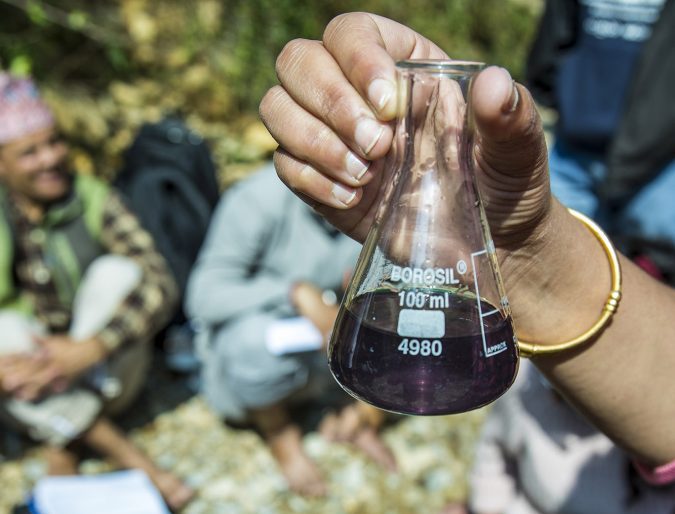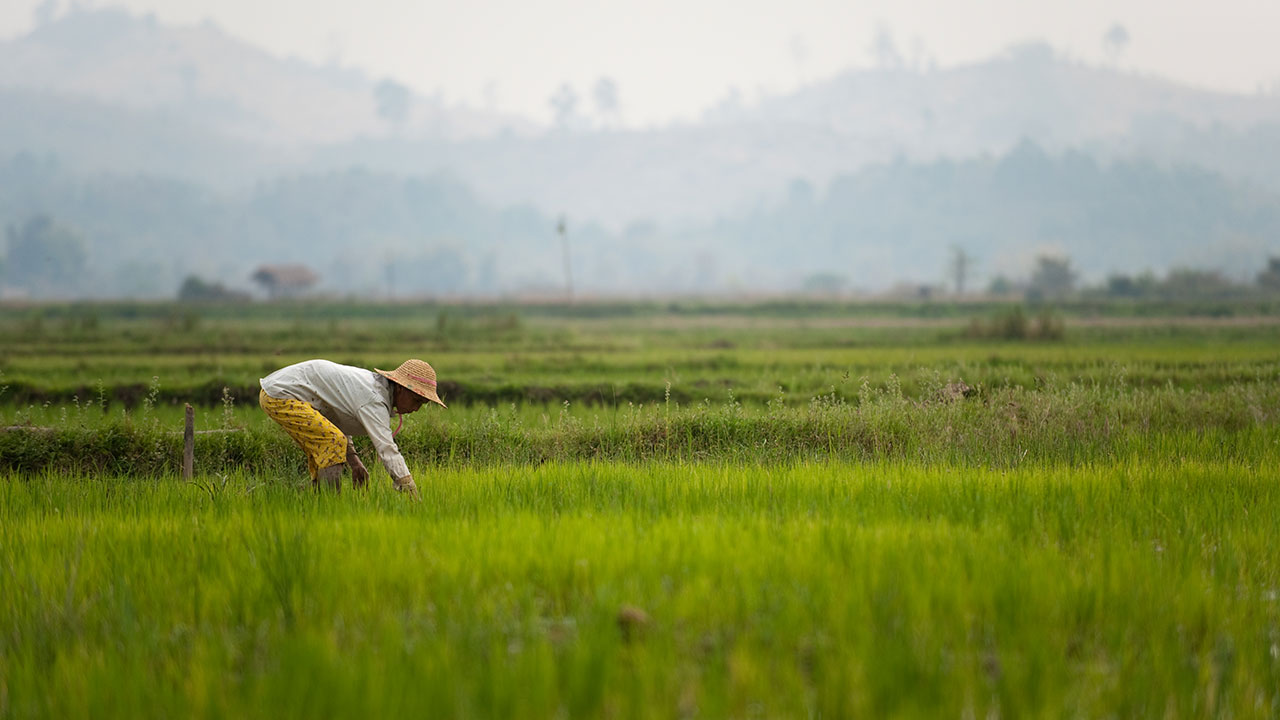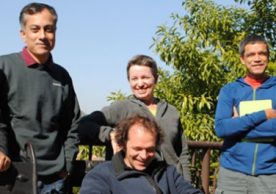KIX call for concept notes: Knowledge and innovation for education in emergencies and fragile, conflict and violence-affected contexts


Table of Contents
1. Introduction
2. Challenges of education in emergencies and fragile, conflict and violence-affected contexts
3. Grant types, funding scope and duration
4. Eligibility criteria: General and specific to grant types
5. Expectations of projects
6. Format and requirements for concept notes
7. Evaluation criteria for concept notes
8. The selection process: concept notes, followed by full proposals
9. Inquiries
10. Call timeline and communication of results
11. Additional considerations
Annex A: Integrating gender equality, equity and inclusion (GEI) in research proposals and projects
Annex B: List of eligible countries
1 1. Introduction
The International Development Research Centre (IDRC) and the Global Partnership for Education (GPE) invite concept notes for applied research projects to generate and mobilize evidence to contextualize and scale the impact of promising or proven approaches to improve children’s access and retention in education in emergencies and fragile, conflict and violence-affected contexts in GPE partner countries.
The Knowledge and Innovation Exchange (KIX) is a joint endeavor of GPE and IDRC. KIX supports countries to have and use the evidence and innovation they need to accelerate access, learning outcomes and gender equality through equitable, inclusive and resilient education systems fit for the 21st century. KIX facilitates direct knowledge sharing across GPE partner countries through four regional hubs and funds applied research on their priorities. KIX is part of GPE’s strategy to support transformative change for education in low- and middle-income countries.
The focus of this call arose through a series of consultations with GPE partner countries and an analysis of recent literature, summarized in a scoping study, “ Supporting children’s access and retention in education in emergency, fragile and conflict-affected contexts .”
The objectives of this call are to:
- generate evidence about how to scale the impact of promising or proven innovative approaches to address challenges of access and retention in education in emergency, fragile and conflict-affected contexts
- strengthen the capacities of relevant stakeholders to use that knowledge and innovation
- mobilize the evidence developed to improve policy and practice in education systems, supporting gender equality, equity and inclusion (GEI).
2 2. Education challenges in emergency, fragile, conflict and violence-affected contexts
Children face particular challenges in emergencies like epidemics, climate change and other disasters, as well as in contexts of fragility, conflict and violence (FCV). Sudden and sometimes protracted challenges can layer on top of existing inequalities. This adds up to a growing problem – the number of children who are not in school. UNESCO (2023) estimates that as of 2022, there were 250 million children and youth out-of-school, and many are at a heightened risk of dropping out.
Policies, programs and interventions need to address education challenges at multiple levels: students, schools, communities, and the overall education system. Research for out-of-school children and youth and those at risk of dropping out in these contexts is crucial.
The challenge
This call for concept notes is for applied research addressing these complex challenges in affected GPE partner countries . Projects will generate and mobilize evidence to adapt, contextualize and scale the impact of promising or proven approaches to support children’s access to, and retention in, quality education in emergency and FCV contexts while promoting GEI.
Two interrelated sub-themes arose from the literature review and stakeholder input from GPE partner countries:
Sub-theme 1: Access or re-entry for out-of-school children and retention of at-risk learners
Under this sub-theme, the call seeks to fund applied research that supports access to education or re-entry for out-of-school children and the retention of those at risk of dropping out. GPE partner country representatives reported that emergencies and FCV contexts result in population displacements, disrupt access to educational facilities and increase cultural pressures and economic limitations, which deter students from attending or returning to school and push others to the brink of exclusion. These barriers can intersect with pre-existing challenges such as limited infrastructure, poor education quality, scarcity of qualified teachers, high dropout rates, the growing digital divide, and disparities related to geography, gender, disability or other factors of educational exclusion. In addition, contexts of emergency and FCV can have negative emotional and psychological effects on children and youth, diminishing their overall well-being and disrupting social connections with peers, families and communities.
Various initiatives have been designed to address education challenges associated with emergencies and FCV contexts with a view to providing high-quality, relevant and safe school experiences. This can be through relevant curriculum, gender-responsive or transformative pedagogies and inclusive education, as well as policy initiatives to weave these efforts together. For instance, there are innovative approaches for remote or distance education and flexible learning pathways, such as accelerated education programs, complementary basic education, alternative education and remedial support or catch-up programs. There is also the integration of disaster risk reduction (DRR) themes into curriculums, which can support emergency readiness. Due to the prevalence of trauma and poor mental health in emergencies and FCV contexts, education systems have identified the need for enabling targeted policies and programs such as prohibiting the use of corporal punishment, integrating socio-emotional learning in the curriculum, and school leadership training, counselling programmes or awareness-raising campaigns to create supportive educational; environments, free of bullying, harassment and other forms of discrimination including gender-based violence. While numerous proven or promising approaches exist, scaling-oriented research is needed to help expand and improve their impact and support their broader systemization.
Areas of research interest for this sub-theme focus on the re-entry of children who are out-of-school and those at risk of dropping out, including how to adapt, contextualize and scale the impact of innovation that addresses the following
- Research on how policies and programs that support the re-enrolment and retention of out-of-school and at-risk learners can be scaled and institutionalized, contextualized, accredited, costed and appropriated for the reasons children are out-of-school. This includes research focusing on alternative and flexible learning pathways and how such pathways can support GEI.
- DRR strategies, policies and plans : More research is needed to understand “what works” for DRR planning and how the needs of regionally or nationally marginalized groups can be integrated to ensure their continuity of learning when emergency situations occur.
- Socio-emotional learning (SEL): Research on integrating SEL in policy and practice, curriculum and assessment to equip students and make educational environments safe and supportive. Research can focus on effective practices in career counselling and other psychosocial support. Contextualized research is also needed to understand how to shift community attitudes to increase openness for children and adults alike to discuss their struggles and find support.
Sub-theme 2: Teacher training and support for work with out-of-school and at-risk children
Teacher professional development (TPD) is particularly relevant in emergencies and FCV contexts, especially in low- and middle-income countries. Teachers need diverse skills to support children returning to school after sometimes long absences and ensure at-risk children remain enrolled. Innovative approaches to teacher education and development are needed, including inclusive methods, remedial support, differentiated instruction and appropriate response to learners’ needs. It is essential to provide continuous professional development opportunities that encourage teachers’ participation and use of collaborative learning environments focused on teaching and learning in education in crisis or with children at risk of dropping out of school. This should link with broader systems of pre- and in-service teacher training and support, and target school and district leaders in addition to teachers directly. Advancements in digital technology, particularly in remote and distance-education environments, can help. Supporting gender equality and well-being for teachers is also a top goal given the challenging conditions they face when they work in education in emergency and FCV contexts – teachers themselves may be refugees or displaced and dealing with trauma. Teachers can be well-placed to support socio-emotional well-being. This calls for improving teacher training on mental health and psychosocial support (MHPSS) in addition to creating supportive policy environments, incorporating SEL into the curriculum, and utilizing school or community efforts such as school leadership training, counselling programmes or awareness-raising campaigns, as mentioned in sub-theme one.
Areas of research interest for this sub-theme focus on teacher development and support for working with at-risk and out-of-school children in emergencies and FCV contexts, including how to adapt, contextualize and scale innovation that addresses the following:
- Scaling and sustaining effective TPD: More research is needed to understand how TPD can be deployed at scale to support teachers working in emergency and crisis contexts, including teacher education content, education in emergency, content integration, teaching approaches, mentorship, curriculum materials and delivery methods. In addition, research is needed to understand how TPD can be used to support SEL at scale. This may include teacher training for SEL and MHPSS, and integrating SEL into curricula and assessment, including using in-school SEL responses for those at risk of dropping out.
- Making TPD policy more inclusive: Research on policy focusing on financing, including compensation of educators in emergency and FCV contexts, scaling up and institutionalizing credential-recognition practices and re-skilling of the teacher workforce, method and cost-effectiveness of TPD programs in these contexts.
- Supporting the well-being of teachers : More research is needed on how to effectively support GEI as well as the well-being of teachers and other education professionals working in emergency and crisis contexts. This may include policies, training, school-wide support and enabling conditions built through multiple levels of education systems.
3 3. Grant types, funding scope and duration
GPE KIX will award grants to institutions on a competitive basis . There will be two types of funding available through this call:
Multi-country grants are strongly encouraged as they facilitate inter-country learning. Single-country grants will be considered where multi-country work is difficult and/or when the proposal provides a compelling and unique opportunity for learning from a single-country case.
Projects should be scheduled to be completed within 24 months , including all research activities and final reporting.
Concept notes must target and be grounded in relevant contexts in GPE partner countries (see Annex B for the list of countries).
IDRC reserves the right to fund additional proposals from this call if/when more funding becomes available.
IDRC is under no obligation to issue any funds prior to the applicant returning a fully executed grant agreement to IDRC.
All grants are subject to sufficient funds being made available to IDRC by the Parliament of Canada or under a donor partnership agreement with a particular external funder.
IDRC reserves the right to cancel this call for concept notes at any time without prior notice and/or to not issue any grants under this process.
4 4. Eligibility criteria: general and specific to grant types
Only concept notes that meet the eligibility criteria will be considered.
General eligibility criteria for all grant types
Concept notes must be submitted by nationally/internationally registered or incorporated organizations that are based in low- or middle-income countries. These could include, inter alia , research institutions, universities, think tanks, network secretariats, associations, civil society organizations, non-profits or the private sector.
Applicants must have independent legal status (or “legal personality”), be capable of contracting in their own right and name, receiving and administering funds, and have the authority to direct proposed project activities. Applicants must be able to demonstrate their legal status through written documentation. Legal status will only be reviewed if and when applicants are selected following technical selection.
Concept notes may be submitted by individual organizations, or by consortia of up to three organizations.
Concept notes from consortia must name one lead organization, which can sub-grant to the others.
Concept notes from, or that include, private-sector partners should demonstrate how private-sector resources – financial or technical know-how – will contribute to the project. Organizations/consortia must have a strong presence and track record of work in the education sector of GPE partner countries.
Who is NOT eligible?
- individuals
- government ministries and agencies (not eligible for funding but can be involved in projects)
- for-profit providers of core education services
Specific eligibility criteria for the grant types
Single-country grant concept notes must be submitted by eligible national organizations based in the country of focus. They may apply as individual organizations or lead a consortium that includes other organizations from within or outside the country.
Multi-country grant concept notes must be submitted by organizations based in low- or middle-income countries. They may apply as individual organizations or lead a consortium that includes other organizations from within or outside the country or region.
5 5. Expectations of projects
Linkages to education policy priorities and key stakeholder endorsement
Concept notes must demonstrate clear links with education policy priorities and define plans for effective engagement of key stakeholders such as the ministry of education. This could be evidence of clear alignment with current official documents such as the partnership compact, the education sector plan, or other similar strategic plan documents or policies. Concept notes should demonstrate that the organization applying for the grant is working in and has relationships with relevant education stakeholders in the target countries.
High-quality research for development
Funded projects will be expected to undertake research for development, which is designed to address the objectives of this call, namely: a) to build knowledge, innovation, and evidence, b) to strengthen capacity, and c ) to mobilize knowledge for policy and practice. Projects should be problem-focused and action-oriented. They should creatively identify and engage with relevant users of the knowledge and innovation. They should involve education-system stakeholders throughout to ensure that research is relevant and positioned for use in policy and practice. They will be expected to meet the quality standards expressed in IDRC’s Research Quality Plus (RQ+) framework . They must be methodologically rigorous, original and relevant. They must be ethically sound, address GEI dimensions, and be well-positioned for use by different stakeholders.
Research for scaling innovation, using a critical approach
Concept notes are expected to focus on existing promising or proven innovative approaches that have potential to be scaled and facilitate transformative change in GPE partner countries. Innovations may include, but are not limited to, tools, practices, policies, programs, technologies, frameworks, methodologies or any other interventions that can be used to address the challenge, sometimes in combination. The innovative approaches may come from within or outside GPE partner countries. Issues of scaling impact should be built into the research questions and methodology.
KIX will not support the large-scale implementation of identified innovations. Nor will it fund the development of new innovations. It will only fund applied research to generate evidence in support of scaling the impact of promising or proven innovations that applicants are expected to present in their proposals, along with the evidence of their effectiveness. This scaling research may include:
- adapting and refining the innovations to the contextual needs of the selected countries
- developing and testing means and models to scale them
- supporting capacity strengthening of stakeholders who will adapt, adopt and scale the innovations
- conducting a cost analysis of the innovations
- assessing results
Concept notes should take a critical approach to scaling. Scaling is not only about making something bigger or increasing the coverage of an intervention. Scaling is the process of improving the reach, breadth, quality, equity and sustainability of the changes, benefits and solutions that innovations bring to education systems. Projects should use the research process to determine an optimal scale for their innovation (see more in Gargani and McLean, 2017 ).
Gender equality, equity and inclusion
Concept notes should demonstrate how GEI will be promoted, using an intersectional approach, with respect to both (i) team composition and organization(s) comprising the research team; and (ii) the design and implementation of the proposed research, including a concise theory of change and knowledge-mobilization processes. Gender-blind concept notes will not be considered. Annex A provides a series of questions to help guide the integration of GEI in research proposals and the implementation of projects.
Being part of KIX
The projects funded out of this call will become part of KIX. They will be invited to participate in joint learning and synthesis activities with other projects, and to share their knowledge-mobilization strategies with regional hubs. They will be invited to participate in the KIX-wide project called Research on Scaling the Impact of Innovations in Education . They must link their results to the KIX-wide results framework and track some common results in their monitoring, evaluation and learning (MEL) strategies. Proponents should anticipate allocating necessary personnel and at least 20 days to these KIX-level activities in their plans and budgets.
6 6. Format and requirements for concept notes
All applications for this call for concept notes should be submitted in English, French or Spanish using the online application form link .
The application form will ask applicants to provide the following:
7 7. Evaluation criteria for concept notes
Concept notes will be evaluated based on the criteria below.
8 8. The selection process: concept notes, followed by full proposals
Stage 1: call for concept notes (march 21, 2024 – april 25, 2024).
Eligible applications must be submitted no later than April 25, 2024 11:59 p.m. EDT . Applications received after the deadline or incomplete applications will not be considered. All applications must be submitted using the online application form. An acknowledgement of application receipt will be sent following a timely submission.
Concept notes will be reviewed by a review committee comprised of IDRC program staff, using the evaluation criteria outlined above. Shortlisted applications will be invited to submit full proposals.
Applicants in the concept note phase will be informed of the status of their application by May 30, 2024 .
Stage 2: Full proposal submissions (May 30, 2024 – July 11, 2024)
Shortlisted applicants will be invited to submit a full proposal that elaborates on the concept note. Proposals will be longer and more detailed, with additional sections on research ethics, monitoring, evaluation and learning, and will provide further evidence of stakeholder engagement in the proposed project. They will include a budget and workplan. IDRC will share comments to guide the development of the proposals, as well as the evaluation criteria by which they will be assessed.
Shortlisted applicants are required to submit their proposals using the online application form by July 11, 2024 11:59 p.m. EDT . Applications received after the deadline or incomplete applications will not be considered.
Review and ranking of full proposals: Submitted proposals will be reviewed for completeness by IDRC, followed by an external review by the KIX Independent Assessment Panel (IAP). At least two IAP members will assess each proposal, using pre-defined criteria that will be shared with all applicants in advance. The IAP will recommend which proposals are of sufficient quality to receive KIX funding.
Institutional and risk assessments: IDRC will carry out initial institutional and risk assessments of the shortlisted institutions.
Recommending a cohort of projects: IDRC will identify a cohort of IAP-recommended proposals up to the maximum budget for the funding envelope available for the call. The cohort will fund organizations based in low- or middle-income countries and balance thematic, geographic and applicant diversity from within this call and across the KIX portfolio. The cohort will be submitted for approval from the KIX Executive Committee.
Notification of results: All applicants at the full proposal stage will be informed of the outcome of their application by August 30, 2024.
Request for changes: IDRC reserves the right to request successful applicants to make changes based on feedback from the IAP, IDRC and GPE, if necessary. IDRC may also facilitate additional interaction with KIX representatives in GPE partner countries to further hone the selected proposal to country realities.
Inception phase: Upon selection and the signing of the grant agreement, grantees will be oriented to KIX objectives and processes over a period of two months, called the inception phase. During this period, KIX program officers will work with grantees to align projects with the overall KIX theory of change and results framework and provide support and guidance on important requirements such as scaling research, GEI, knowledge mobilization and MEL reporting.

9 9. Inquiries
One webinar, hosted in English, French and Spanish, will take place on April 4, 2024 to answer questions about this call for concept notes. Questions must be submitted in advance to [email protected] ; the question submission deadline for the webinar is March 28, 2024 .
To attend the webinar, please register in advance. Only those who register will have access to the webinar. If you are unable to attend, please monitor the KIX YouTube channel for the recording.
Any inquiries that affect all applicants will be posted anonymously online on the KIX call FAQ page . Applicants are strongly encouraged to monitor this website for any information updates regarding this call.
10 10. Call timeline and communications of results
Submission process - concept notes
Call launch: March 21, 2024
FAQ webinar: April 4, 2024
Deadline for submitting concept notes: April 25, 2024 11:59 p.m. EDT
Selection process – concept notes
Concept notes review: May 2024
Applicants whose concept notes have been shortlisted will be informed and invited to submit a full proposal: May 30, 2024. Unsuccessful applicants will also be notified at this time.
Submission process – full proposals
Webinar to provide common feedback and answer questions for those submitting full proposals: June 2024
Deadline for submitting proposals: July 11, 2024
Selection process – full proposals
Proposal review: July and August 2024
Successful proposals informed of their selection for potential funding contingent on meeting any specific conditions: August 30, 2024. Unsuccessful applicants will be notified at the same time.
11 11. Additional considerations
- As a Canadian Crown Corporation, IDRC is subject to Canada’s Access to Information Act . Consequently, any submissions in response to this call for research proposals will be held by IDRC in a manner consistent with the Access to Information Act , including IDRC's obligations to disclose documents requested by members of the public.
- By way of submitting an application under this call, applicants consent to the disclosure of the documents they submit to IDRC and external reviewers who are involved in the assessment and selection processes of proposals. If selected for funding, applicants further consent to the disclosure of their name and the title of the proposed project in any announcement of selected projects. Unsuccessful concept notes and proposals will be destroyed within 180 days after the close of the application period. Proposals deemed as high quality by the IAP, but which do not receive funding from this round, will be retained for an additional 12 months, based on applicant permissions.
- In submitting a concept note, applicants will be asked to agree to abide by GPE's Policy on protection from sexual exploitation, abuse and harassment , the IDRC Corporate Principles on Research Ethics , the I DRC Open Access Policy and the IDRC Open Data Statement of Principles .
- The technical selection of a proposal does not constitute a formal commitment by IDRC to fund the project. Applicants whose proposals are recommended for funding will undergo an institutional assessment. This step assesses the potential risk of material loss of IDRC funds due to weaknesses in the capacity of an applicant’s institution to manage or report on the financial aspects of project activities, or because of economic and political conditions relating to the institution's operating environment. IDRC reviews three broad areas in its assessment of what measures should be applied to minimize such risk: the materiality of the investment; the management capacity of the applicant’s institution; and the wider environment within which the organization operates. IDRC will have no obligation to issue any funds prior to the applicant returning an executed grant agreement issued to them by IDRC.
- IDRC reserves the right in its sole discretion at any time to withdraw support for a project or recipient where the i) implementation, ii) monitoring of, or iii) access to a project is not possible or would jeopardize the safety of staff, contractors or anyone affiliated to IDRC. Additionally, where it is determined that a project or participation of an institution or individual would or could reasonably violate laws, sanctions or other obligations with which IDRC and/or the applicant must comply, support for the project may be withheld or withdrawn.
- Country clearance requirements: IDRC has made general agreements for scientific and technical cooperation with several governments. These agreements establish the framework for IDRC cooperation with that country by defining the rights and obligations of both IDRC and the government. As such, the applicant institution may be required to obtain country approval in accordance with these agreements prior to receiving funding from IDRC. This requirement applies only to selected applications. IDRC reserves the right to not pursue the funding of a selected project if the country approval is not secured within six months after IDRC officially announces approval of the project, as this would jeopardize the timely completion of the initiative.
- Applicants whose proposals are selected to recommend for funding will be required to provide additional documentation before confirmation of funding of their projects. IDRC reserves the right to rescind its selection of a project if it is deemed that the information provided in the application is false or misleading.
A ANNEX A: Integrating gender equality, equity and inclusion (GEI) in research proposals and projects
IDRC’s Equality Statement states: “We support the generation of knowledge — including by individuals from diverse genders, communities, histories, and experiences — that tackles the systems that perpetuate inequalities on the basis of identity.” Integrating GEI in all stages of research projects is essential for producing research that is fair, equitable and inclusive, and ultimately promotes equal opportunities and treatment for all people regardless of their gender, sexual orientation, race, religion or any other identity.
When a project integrates GEI considerations across its design as well as methodologies, outputs, outcomes and organizational practices, the project is gender-responsive or gender-transformative (see IDRC’s Guide to integrating gender in your proposal ). Even for a call that specifically targets GEI issues, proposals should consider how to orient projects to be either gender-responsive or gender-transformative in all aspects:
Problem identification and background
Including GEI in the problem identification and background contextualizes the research problem within the broader sociocultural and historical context. It helps to explain how gender and inclusion-related challenges in education have emerged and how they are perpetuated.
- To what extent does the problem identification and background section discuss the contextual factors that contribute to GEI challenges?
- What does the existing research say about the issues in focus with respect to GEI?
- To what extent does the problem identification and background section clearly articulate the specific GEI needs or challenges to be addressed in the project?
- Does the proposal include an intersectional approach to understand how gender intersects with other aspects of identity, such as age, ability, race, ethnicity, geographic location, sexuality and wealth status?
Research purpose and anticipated results
Including GEI in research objectives, research questions and project results helps to focus the project on GEI and ensure that it works towards addressing identified GEI challenges.
- To what extent do the research objectives and questions incorporate GEI issues?
- To what extent do the results - outputs, outcomes and intended impact - address GEI issues and their underlying causes?
Project design and methodology
Including GEI in the research design and methodology helps to incorporate a diversity of perspectives, including those of marginalized groups who may be underrepresented in the research.
- Are different groups involved in the research process in a meaningful, participatory way? To what extent do they represent the diversity of target groups, including the most marginalized?
- How does the design accommodate for the effective participation of all stakeholders?
Knowledge-mobilization strategy
Including GEI in knowledge-mobilization activities helps to ensure that GEI issues are raised and addressed beyond the project.
- Are GEI considerations included in the knowledge-mobilization strategy?
- How will GEI-specific findings be documented and shared?
- Are you considering involving relevant key stakeholders or change makers (government, NGOs and others) that work on and influence gender-based discrimination and inequalities in the knowledge-sharing process?
Monitoring, evaluation and learning
Including GEI in your MEL plan ensures that there are GEI targets set, their progress is monitored, and learnings are documented and reported.
- To what extent is GEI integrated into the project's MEL plan?
- Does the proposal outline mechanisms to monitor and report on GEI-related results?
Project team capacities
Including GEI expertise and ensuring GEI representation in the composition of the team is important for ensuring diverse perspectives and experiences, addressing gender and inclusion-related challenges, conducting ethical research, engaging stakeholders and disseminating findings to diverse audiences.
- Do you have a person responsible for leading GEI integration?
- Does the project team include a balanced mix of people of different genders? What roles do they have?
- How might you strengthen the capacities of the research team regarding GEI?
- Have you highlighted the expertise within the team needed to conduct rigorous gender analysis and to analyze data by sex and other relevant indicators?
B ANNEX B: List of eligible countries
- Our mission
- Digital library
- Science applications
This site uses cookies, as explained in our terms of use . If you consent, please close this message and continue to use this site.
Research grants
SANDEE provides research support to researchers and institutions from South Asia and the HKH region interested in the inter-connection among development, natural resource use, and the environment.

CALL FOR RESEARCH CONCEPT NOTES
Economics of climate risks, natural resource use and environmental change
SANDEE invites concept notes in the areas of environmental and resource economics relating to the development of South Asia and the HKH region.
Deadline: 31 May 2024
Research grants are provided for conducting research on topics related to economics and the environment in South Asia and the HKH region. Multi-disciplinary projects with a robust economic focus are encouraged. Cross-border collaborations and trans-boundary projects are prioritized. Currently, SANDEE’s research activities focus on three prioritized research themes:

Prioritized research area: Ecosystems management
Ecosystems provide a variety of provisioning, regulating, supporting and cultural services. With human activities, some of these services are being lost at an accelerating rate. Changes in ecosystems have short-run as well as long-run implications for livelihoods and the health of natural systems. Research on ecosystems management will focus on:
- Understanding the implications of ecosystem changes for economic and social systems
- Economic analysis of conserving ecosystems and their services by evaluating costs and benefits to different stakeholders, especially the poor
- Examining different institutional arrangements to manage ecosystem services
Prioritized research area: Economics of climate change
With climate change, South Asia is expected to face more variation in temperature and precipitation, more extreme weather events, and sea level rise over time. These changes are affecting millions of poor people in South Asian countries. Research on economics of climate change will focus on:
- Evaluation of the impacts of climate change
- Economic analysis of adaptation measures
- Evaluation of the mitigation strategies, particularly those that offer local co-benefits
- Examination of institutions and policies that need to be in place for low carbon growth and long-term adjustment to climate change

Prioritized research area: Policies and programs for greener development
Governments and other organizations in South Asia put forward a variety of regulations and policies to manage local to global environmental problems. There is a need to examine alternate policy options and to evaluate their impacts in order to ensure that we are on a sustainable path. Under this theme, research will focus on:
- Program evaluation of the impacts of environmental policies, regulations, and programs
- Assessment of the economic incentives associated with different regulatory and market mechanisms and their contribution to policy compliance
- Related content

Regular research grants

Study grants and micro grants

Sir Partha Dasgupta Fellowships

Grant resources
- On this page
- related links
- Ecosystems management
- Economics of climate change
- Policies and programs for greener development
- SANDEE home page

COMMENTS
Global Call for Research Concept notes: climate-smart livestock systems. This document is a call for research concept notes for funding support from the International Development Research Centre, the Bill & Melinda Gates Foundation and the UK’s Foreign, Commonwealth & Development Office.
This call for concept notes is for the climate-smart innovations in livestock systems research stream. Thematic focus areas. Four thematic areas have been identified as being research priorities for CSLS program: water, pastures and feed management. Indigenous knowledge systems, climate data and management.
The call targets at building the capacity of junior and mid-career researchers interested with sharpening research skills using rigorous methods of impact evaluation. The call accepts concept notes prepared by individual researchers as well as those prepared jointly by a team of researchers.
The International Development Research Centre (IDRC) and the Global Partnership for Education (GPE) invite concept notes for applied research projects to generate and mobilize evidence to contextualize and scale the impact of promising or proven approaches to improve children’s access and retention in education in emergencies and fragile ...
SANDEE invites concept notes in the areas of environmental and resource economics relating to the development of South Asia and the HKH region, with a focus on the first two strategic areas of ICIMOD’s work.
The concept note is expected to give a clear idea on the objectives and nature of the research to answer specific policy questions using the available data (NSCA, ILFS and NPS) complemented with other official statistics and data.
CORE Call for Concept Notes (Due: July 31, 2020) Description: The Texas A&M Energy Institute (EI) launches the first call for Convergence Research (CORE) Incubator Concept Notes. This is an internal competitive call whose primary objectives are to: a. incentivize convergence research
This knowledge-into-action call aims to support locally-led climate-resilient action across the themes of gender equity and social inclusion, finance for resilience, ecosystem-based approaches, enhancing climate literacy and empowering young people in Africa.3 .
Call for Research Concept Notes. The Transform Nutrition Research Consortium invites outline proposals for studies of up to 24 months duration which will add to the evidence base on nutrition-relevant policy and action in Eastern Africa.
CALL FOR RESEARCH CONCEPT NOTES. Economics of climate risks, natural resource use and environmental change. SANDEE invites concept notes in the areas of environmental and resource economics relating to the development of South Asia and the HKH region. Deadline: 31 May 2024. Read more Application form Flyer.